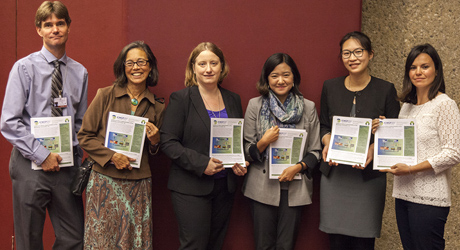CAMBRIDGE, MA—September 29, 2017—The MIT International Policy Lab (IPL) has sent representatives to participate as observers to the first Conference of Parties (COP-1) to the Minamata Convention on Mercury, through a delegation led by co-faculty director Noelle Selin. The first conference of the convention, sponsored by the United Nations Environment Programme, is being held in Geneva, Switzerland, from 24 – 29 September, 2017.
The Minamata Convention is a global, legally-binding treaty that aims to protect human health and the environment from mercury pollution. “Attending COP-1 will help enhance the impact of our research,” said Selin, associate professor in the Institute for Data, Systems and Society and the Department of Earth, Atmospheric and Planetary Sciences. “As the Minamata Convention has now entered into force, its parties are addressing how to make its implementation more effective. The scientific research we do at MIT on mercury can play an important role in helping to assess the pathway of mercury from its emissions to its impacts on human health and the environment, and identify whether mercury policies are having an impact.”
Members of the delegation deliver mercury science policy briefs, developed by the 13th annual International Conference on Mercury as a Global Pollutant (ICMGP), to Minamata delegates.
L-r: Henrik Selin, Boston University (ICMGP Scientific Steering Committee); Celia Chen, Dartmouth (ICMGP Co-Chair); Noelle Selin, MIT (ICMGP Executive Committee); Sae Yun Kwon, MIT (Postdoc); Amanda Giang, MIT (Postdoc); Helene Angot, MIT (Postdoc)
(Photo courtesy IISD/ENB | Mike Muzurakis)
Selin’s research focuses on understanding of how mercury, a toxic pollutant, travels and cycles in the environment, under various policy scenarios. Her team will be helping to disseminate a synthesis of mercury science relevant to decision-making and policy developed by the 13th annual International Conference on Mercury as a Global Pollutant.
The delegation from the MIT International Policy Lab consists of Noelle Selin, associate professor in the Institute for Data, Systems and Society and the Department of Earth, Atmospheric and Planetary Sciences; and Amanda Giang, Helene Angot, and Sae Yun Kwon, all Postdoctoral Associates at MIT.
ABOUT THE MIT INTERNATIONAL POLICY LAB
The mission of the International Policy Lab (IPL) is to enhance the impact of MIT research on public policy, in order to best serve the nation and the world in the 21st century. The IPL helps participating faculty across the Institute to define policy goals and translate their scholarship into policy recommendations. The IPL connects these scholars with relevant policymakers, media appearances, Congressional testimony, and other events designed to impact the policy process. IPL support allows MIT researchers to have a maximum impact on policy with minimal expenditure of faculty time.



